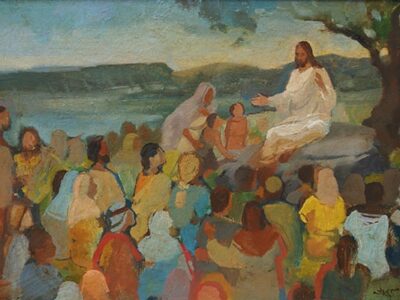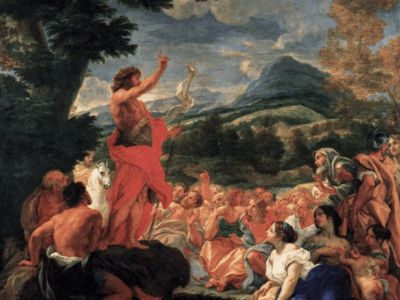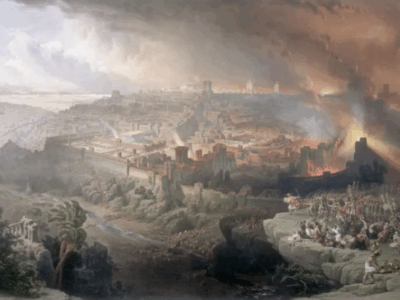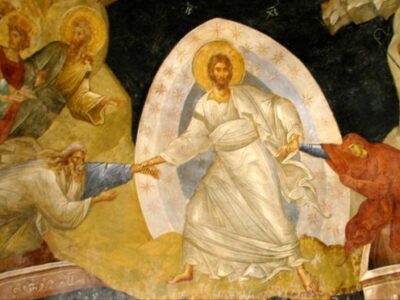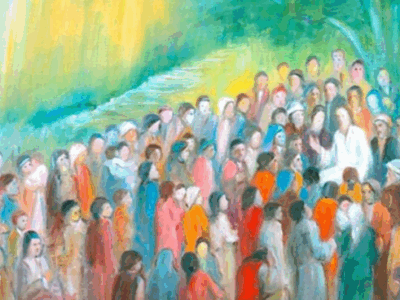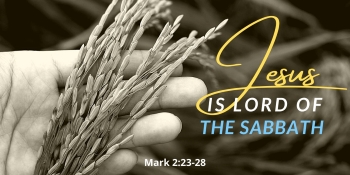
Embracing Sabbath’s Sacred Rhythm
Year B
Deuteronomy 5:12-15
Psalm 81:1-10
2 Corinthians 4:5-12
Mark 2:23-3:6
May the words of my mouth O God… speak your truth…
There is a sacred rhythm to Sabbath… a sacred rhythm that is gift… Sabbath is not simply a day off… not necessarily a day to grill some brats and have a cold one… it’s a day to commune with our Creator… and to see each other as holy… ] and when we observe the Sabbath… it becomes a radical act of defiance against the tyranny of time… a declaration that our self-worth is not measured by our productivity… but by our relationship with God…
Rabbi Abraham Joshua Heschel was a renowned Jewish theologian… his writings on spirituality… ethics… and social justice continue to inspire and influence religious thought worldwide… and he reminds us that the Sabbath is a sacred opportunity to encounter the divine presence… that Shabbat creates the architecture of time… ] is a sanctuary in time… and not merely a day of rest… he contends that the spiritual dimension of Sabbath offers a unique opportunity for us to experience transcendence… and that we’re invited to step out of the relentless pace of everyday life… so we can enter a sacred space of reflection… ] and in seeking this perspective… we can create a deeper awareness of the presence of God in the world… and cultivate a sense of wonder and gratitude for the gift of existence… and Rabbi Heschel emphasizes the ethical and social dimensions of Sabbath… that it is a reminder of the inherent dignity and worth of all human beings… and he advocates for observing the Sabbath as a day to extend hospitality to others… and to work towards creating a more just and equitable society…
He reminds us that Sabbath is a day of mercy and compassion… a time to extend God’s love to those in need… reminds us that we are invited to embrace a deeper understanding of Sabbath as a celebration of God’s creative and redemptive power… a day to reorient our lives… to savor the beauty of creation… and to develop a spirit of gratitude and awe… and this approach challenges us to resist the cultural pressures of mindless busyness… by embracing the countercultural rhythm of Sabbath rest… and while we may remember that these laws were given to the ancient Israelites… as part of their covenant with God… they still hold value for all people…
In the opening verses of this morning’s Gospel… we find Jesus and the disciples walking through the grain fields on the Sabbath… and they pluck heads of grain to eat… because they were hungry… the Pharisees confront Jesus… tell him that what they’re doing is unlawful… accuse them of working… of violating the Sabbath law… ] in response… Jesus challenges their legalistic interpretation… and declares that the Sabbath was made for man… and not man for the Sabbath… Jesus doubles down… reminding them about David’s consumption of the Bread of the Presence… which represented the ongoing fellowship between God and the Israelites… and Leviticus 24:5-7 describes this special bread…
You shall take fine flour and bake twelve loaves from it… seven liters of flour shall be in each loaf… and you shall set them in two piles… six in a pile… and you shall put pure frankincense on each pile… that it may go with the bread as a memorial portion… as a food offering to the Lord…
The table upon which the Bread of the Presence was placed… was made of acacia wood and was overlaid with gold… it was specifically designated for holding the twelve loaves of bread… which were arranged in two rows… symbolizing the twelve tribes of Israel…
One commentary on this passage explains that this bread was not eaten by the deity… but was given to the priests as compensation for their ritual service… but it had to be eaten in the sanctuary complex because of the holiness it absorbed through close and prolonged proximity to God…
And so Jesus refers to 1Samuel 21:1-6… when David and his men were also hungry… so he asked Ahimelech for five loaves of this bread… and they ate… ] and by affirming what David and his men did… Jesus affirms his claim that the Sabbath was made for humankind… and not the other way around…
Perhaps later that same day… the text isn’t clear… Jesus is again in the synagogue… and encounters a man with a withered hand… the Pharisees watch closely… they’ve seen him heal before on this day of rest… and are just waiting to pounce on any wrongdoing he might commit… but with compassion and authority… Jesus again challenges their legalism… and asks… Is it lawful on the Sabbath to do good or to do harm… to save life or to kill…
And in this disagreement… it’s important to notice that Jesus responds in two ways… first… Mark’s Gospel says he was angry and grieved at the Pharisees and their hardness of heart… and when we see injustice in our time… when we see lack of concern for those in need… those feelings of anger and grief are natural… are human… and may even be holy…
But the second response is just as important… Jesus doesn’t lash out against those with whom he was angry… instead he reaches out in love and healing to those in need… ] instead of creating more wounds… Jesus responded in the love which the Pharisees lacked… ] and while it may sometimes be easy for us to act out of anger… it is possible to feel what we feel… but still choose to respond with acts of love…
Both of these Gospel stories… tell about Jesus performing the necessary and holy act of attending to an immediate physical need… even when it disrupts a traditional practice… in both of these cases… and many others… the leaders responsible for maintaining the traditional system had forgotten the Sabbath’s true purpose… ] and Jesus didn’t negate it… but reminded them… and reminds us… that religious and legal systems should work in concert… should promote human welfare instead of restricting it… Jewish sources acknowledge this rabbinic principle as pikuach nefesh… which translates as saving a soul… and which calls for human life and welfare to be privileged over any law… that’s why for example… pregnant women are exempt from fasting on Yom Kippur… that’s why for example… someone who is physically unable to stand is simply exempt from certain prayers which require standing…
Jesus’ focus was on Grace… but the Pharisees’ focus was on Law… he hoped they could hear him… but they were too wrapped up in legalism… ] and then the Pharisees and the Herodians… con-spired… which means… breathed together… about how they could destroy him… Jesus’ actions help us see that some systems are used… to unfairly disadvantage the most vulnerable… on the pretext of honoring religious institutions and beliefs… and so we must ask… when we consider the conflicts around the world… and those in this country… how are we called to disrupt legal and economic systems when they stifle human welfare… and who gets to decide…
Yes… there are times when the law is way out of step with our current reality… and there are times when we try to reframe our current reality so we don’t feel obliged to follow the law… but when we create Sabbath space… when we prevent those things which are not essential to our faith from distracting us… when we favor the Spirit of the Law over the letter of the law… we invite God to write God’s laws on our hearts… and we will respond to everyone… in love… just as Jesus did…

